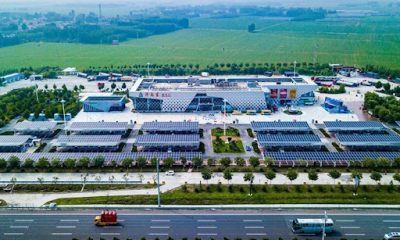News
Trend of stable economic performance remains unchanged in China
By Lu Yanan, People’s Daily
“The pandemic made a big impact on economic operations in April, but the impact was short-lived and external. The fundamentals sustaining the steady and long-term growth of the Chinese economy remain unchanged. The overall trends of economic transformation and upgrading and high-quality development remain unchanged,” Fu Linghui, spokesperson of China’s National Bureau of Statistics (NBS), said at a press conference held on May 16.
The country has many favorable conditions for stabilizing the economy and achieving the expected development goals, according to Fu.
“With various policies and measures helping effectively coordinate anti-epidemic responses and social and economic development, the Chinese economy can overcome the impact of the pandemic, gradually achieve stable growth and pick up pace, and maintain stable and sound development”, Fu said.
Due to the resurgence of COVID-19 cases at home, China’s value-added industrial output dropped by 2.9 percent year on year in April, while the country’s index of services production declined by 6.1 percent and the total retail sales of social consumer goods fell 11.1 percent from the same period last year, according to data released by the NBS on the same day.
April witnessed frequent resurgence of local COVID-19 cases in many provinces across the country. As residents shopped in offline stores and ate out less, sales of non-essential goods and the catering sector were significantly affected. In particular, businesses above designated size in the seriously hit Yangtze River Delta region and the northeastern region of the country suffered a year-on-year reduction of more than 30 percent in their retail sales of consumer goods.
“Overall, the decline in consumption in April was mainly due to the temporary impact of the pandemic. The pent-up consumption potential will be gradually unleashed when the pandemic is brought under control and production and life return to normal,” Fu said.
Since mid-to-late April, domestically transmitted COVID-19 infections have been on the decline and the epidemic situation in northeast China’s Jilin province and east China’s Shanghai, two of the worst-hit regions in the latest COVID-19 outbreaks, is gradually improving, which is helpful in creating a favorable environment for consumption, according to Fu.
The country’s efforts to maintain stable macroeconomic performance and strengthen assistance for enterprises to stabilize employment and create more jobs will ensure people’s spending power, Fu said, adding that as policies to promote consumption take effect, the country is expected to continue its consumption recovery.
China’s industrial production was seriously affected by COVID-19 resurgence in April. Impeded transportation and logistics, among other factors, have led to a decline in industrial output, with the value-added industrial output falling by 2.9 percent year on year in the month and that of the manufacturing sector dropping by 4.6 percent.
The poor performance of the manufacturing sector was mainly the result of the impact of the pandemic on equipment manufacturing sector, including automobile industry, according to Fu, who disclosed that the added value of automobile manufacturing fell by 31.8 percent year on year in April.
Regionally, the Yangtze River Delta region and the northeastern region of the country saw their value-added industrial output drop by 14.1 percent and 16.9 percent, respectively, on a year-on-year basis, which was mainly caused by the suspension of production and work in some enterprises affected by the pandemic.
Although China’s overall industrial production slowed down in April, some industries, including energy, basic consumer goods and high-tech manufacturing, still maintained growth and showed strong resilience.
In April, the value added of the high-tech manufacturing sector rose 4 percent year on year. Electronics and communication equipment manufacturing industry, in particular, registered a 9.7-percent growth in added value.
“The trend of industrial upgrading remains unchanged, which mirrors that the trend of sound growth of China’s economy in the long term remains unchanged,” Fu pointed out.
Industrial production is under pressure, which mainly comes from insufficient market demand, weak connection between production and marketing, impeded industrial and supply chains, hindered production cycle, rising production costs as well as declined profitability, Fu noted, stressing that despite these difficulties, the country’s complete industrial system and sound supporting capacity remain unchanged.
With the pandemic being gradually brought under control, traffic and logistics will be smoothened and production cycle will be improved, Fu said. More importantly, the continuous implementation of policies on tax and fee reductions and assistance for enterprises will help shore up business confidence and improve business operations, eventually facilitating continuous recovery of industrial production, Fu added.
Since mid-to-late April, China’s epidemic situation has been generally improving. Some hard-hit regions in the country have been advancing the resumption of production and work in an orderly manner.
So far, nearly 50 percent of the over 9,000 industrial enterprises above designated size in Shanghai have resumed work.
Freight transport services, which were badly affected by the COVID-19 resurgence earlier this year, continued to recover in May, while indicators like electricity generation output also improved.
“Since the beginning of this year, macro-control policies have played a greater role. A new package of tax-and-fee policies have been effectively implemented with liquidity maintaining at a reasonable and ample level. Macro policies have provided greater support for industries facing challenges and key fields and will continue to yield fruits,” said Fu.
On the whole, the impact of the COVID-19 resurgence will not change the trend of stable economic performance in China or the Chinese economy’s strong resilience, huge potential, and broad space for growth, Fu said.
The implementation of various policies will help the national economy recover at a faster pace and realize stable operation and growth, he said.
News
TCN Acknowledges 7th Grid Collapse in 2024

The Transmission Company of Nigeria (TCN) has reported its seventh partial grid collapse in 2024. Despite the recurring issue, TCN’s General Manager of Public Affairs, Ndidi Mbah, reassured the public that efforts to restore power are well underway, with about 90% of substations receiving bulk power.
Mbah noted that the Azura Power Station initiated the grid recovery, although a minor setback occurred. However, power supply has been restored to the Abuja region and other key distribution centers. The Ibom Gas Generating Station remained unaffected, continuing to supply power to the South-South region.
An investigation into the cause of the collapse will commence once full grid restoration is achieved.
News
Jigawa Tanker Tragedy: Shettima, First Lady Mourn Victims, Pledge Federal Support

Vice President Kashim Shettima has expressed deep sorrow over the tragic tanker explosion in Jigawa State, which claimed over 100 lives. In a statement issued by his media aide, Stanley Nkwocha, Shettima, on behalf of President Bola Tinubu, extended condolences to the affected families, praying for strength and comfort in their time of grief.
Shettima assured the public that the federal government is mobilizing resources to support the injured and assist those affected. He has directed the immediate deployment of the National Emergency Management Agency (NEMA) to provide aid. The Vice President also stressed the need for a review of fuel transportation safety protocols to prevent future incidents.
In a separate statement, First Lady Oluremi Tinubu offered her condolences to Jigawa Governor Umar Namadi and the people of Jigawa, praying for peace and comfort for the families affected. She called the incident “unfortunate” and extended prayers for the recovery of the injured and the repose of the souls lost in the tragedy.
News
Nigeria Customs Intercepts Arms, Ammunition Worth N9.5bn Over Six Years

The Nigeria Customs Service (NCS) has revealed that it intercepted a total of 10,598 pieces of arms and 114,929 rounds of ammunition valued at N9.58 billion over the past six years. Comptroller General of Customs, Bashir Adewale Adeniyi, made this disclosure during a press conference on enforcement activities in Zone A.
Adeniyi highlighted that 60% of these seizures occurred in 2023, reflecting the Customs’ increased efforts to curb arms smuggling. He also mentioned that recent operations such as Operation Whirlwind and Operation Swift Sting are part of a strategic response to tackle evolving smuggling tactics.
In addition to arms seizures, the Customs CG announced the largest pangolin scale seizure since 2020, with 9,493 kg of scales confiscated in collaboration with the Wildlife Justice Commission. The joint operation led to four arrests across Kano, Kaduna, and Lagos. The NCS continues to intensify efforts against wildlife trafficking, targeting supply routes in northern Nigeria and border areas.
-

 Business14 hours ago
Business14 hours agoOkpella Monarch: Obaseki Ratified Kingmakers Decision, End 5years leadership Vacuum
-

 Banking10 hours ago
Banking10 hours agoFree Food Saga: Akpabio quoted out of context-CSO
-

 Foreign15 hours ago
Foreign15 hours agoSci-tech innovation fuels China’s high-quality development
-

 Entertainment7 hours ago
Entertainment7 hours agoDavido Declares ‘Timeless’ His Best Album
-

 Entertainment7 hours ago
Entertainment7 hours ago‘Adire’ Secures Four Nominations at the Best of Nollywood Awards
-

 Business7 hours ago
Business7 hours agoWike Urges Nigerians to Pay Taxes for Improved Social Services
-

 Foreign9 hours ago
Foreign9 hours agoQinling Mountains better safeguarded with comprehensive digital platform
-

 Foreign9 hours ago
Foreign9 hours agoExpressway service station in Shandong achieves carbon neutrality






